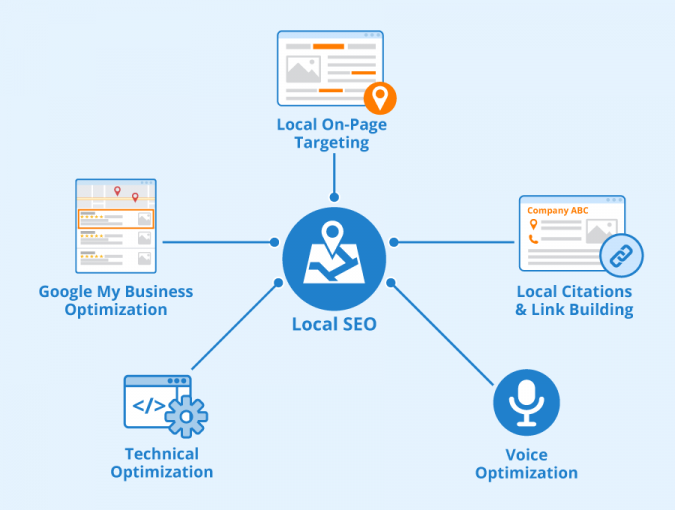Search Engine Optimization (SEO) is the process of improving the visibility and ranking of a website or a web page on a search engine's unpaid results. This is done by implementing various techniques and strategies that help search engines understand the relevance and value of a website or a web page. These techniques include but are not limited to, keyword research, content optimization, backlinks, and technical SEO. The goal of SEO is to increase organic traffic to a website or a web page by making it more visible and relevant to users.
There are three parts of SEO - Onpage SEO, Offpage SEO & Technical SEO.
1. On-page SEO refers to the optimizations that can be made directly within the website to improve its ranking in search engine results pages (SERPs). These optimizations include:
- Content optimization: This includes optimizing the title tags, meta descriptions, header tags, and body content to include relevant keywords and phrases that are being targeted.
- URL optimization: This includes making sure that the URLs are short, descriptive, and contain relevant keywords.
- Image optimization: This includes compressing images, using descriptive file names, and including alt tags that describe the images.
- Internal linking: This includes linking to other pages within the website to help search engines understand the hierarchy and structure of the website.
- Responsive design: This includes ensuring that the website is mobile-friendly and properly optimized for different screen sizes.
- Site structure: This includes optimizing the website's architecture, making it easy for search engines to crawl and index the site.
By implementing these on-page SEO best practices, you can help search engines understand what your website is about, and improve its chances of ranking well in the SERPs.
2. Off-page SEO refers to the optimizations that are made outside of the website to improve its ranking in search engine results pages (SERPs). These optimizations include:
-Link building: This involves getting other websites to link to your website. Search engines view links as "votes" for a website, and the more links a website has, the more authoritative it is considered.
- Social Media: Sharing your website content on social media platforms can drive traffic to your site and improve your visibility in search results.
- Brand Mentions: When other websites or platforms mention your brand or product without linking to your site, it can still help your visibility in search engine results.
- Reviews: Positive reviews on platforms like Yelp, Google, and TripAdvisor can help boost your visibility in local search results.
- Directories: Submitting your website to online directories such as Yellow Pages and Better Business Bureau can help with visibility and link building.
Off-page SEO is important because it helps search engines understand the popularity and authority of a website. Building high-quality backlinks and making sure your brand is visible across the web is a key way to improve your search engine ranking.
Technical SEO refers to the optimizations that are made to the underlying technical infrastructure of a website to improve its visibility and ranking in search engine results pages (SERPs). These optimizations include:
- Crawling and indexing: This involves making sure that search engines can easily access, crawl, and index the content on your website. This includes creating an XML sitemap and submitting it to search engines, as well as fixing any crawl errors that may be preventing search engines from accessing certain pages.
- Site speed and performance: This involves optimizing the website's code, images, and other elements to reduce loading times and improve the overall performance of the website.
- Mobile optimization: This involves ensuring that the website is mobile-friendly and properly optimized for different screen sizes. This includes using a responsive design and implementing mobile-friendly technologies such as AMP.
- Security: This involves implementing security measures such as SSL encryption to protect the website and its visitors from hackers and other malicious actors.
- Schema markup: This involves adding structured data to a website, which helps search engines understand the meaning of the content on a website, and can also be used to enhance the appearance of the website in search results.
Technical SEO is important because it helps ensure that search engines can easily access and understand the content on your website, which can improve its visibility and ranking in search engine results. By implementing best practices for technical SEO, you can help ensure that your website is performing optimally and is well-positioned to rank well in the SERPs.
If you are seeking to hire a talented & dedicated SEO specialist for your project, Get a free quote today.

No comments:
Post a Comment